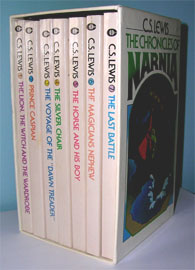The Lion, The Witch and The Arms Dealer
I took the boys last night to see Chronicles of Narnia: The Lion, the Witch and the Film Franchise We Hope Will Be a Cash Machine Like Harry Potter. The film's a wonderfully realized vision of the book, at least through my hazy recollection of tearing through all seven novels 25 years ago in the Collier boxed set, which I've kept all of these years. But the logic of the C.S. Lewis novel makes less sense than it did when I was a child.
The film's a wonderfully realized vision of the book, at least through my hazy recollection of tearing through all seven novels 25 years ago in the Collier boxed set, which I've kept all of these years. But the logic of the C.S. Lewis novel makes less sense than it did when I was a child.
I don't care if they're just a bunch of dissident animals and sympathetic creatures from British folklore. They should have more sense than to create a system of government dependent upon the accidental arrival of children who will serve as monarchs without a clear line of succession.
Even worse, Narnia relies on these minors for military leadership and front-line combat, sending them into battle against such opponents as this giant minotaur.
As a child, I thought it made perfect sense for Peter, Susan, Edmund and Lucy to be equipped with swords, bows and chainmail the moment they acquiesce to the beaver's badgering and agree to overthrow the White Witch.
The second time around, I was a bit squeamish when Santa Claus showed up unexpectedly and gave Lucy two Christmas presents: a dagger and a potion to heal mortal wounds.
Santa's only word of advice before he takes his leave of the six-year-old and the rest of her newly armed siblings? "Battles are ugly affairs."
Comments
I think that's just a general problem with children's literature; if you put a child in the story for children to identify with, said children will end up doing things that we'd find horrifying in real life.
See also: Harry Potter. (Especially the last movie, Goblet of Fire. I don't recall if it was explained away in the book, I can faintly understand the idea that Harry was obligate to participate, but why couldn't he "participate" by sitting down when the starting gun goes off, or, in the last challenge, immediately firing off the red "get me the hell out of here" sparks?) The Wrinkle in Time series. Heck, the majority of Young Adult fantasy/sci-fi books, which all of these are.
I am just waiting for disney to do onto C.L. Lewis what they did to Lewis Carroll and AA Milne.
Sigh
Damn, Santa never gave ME a magic potion for Christmas.
Yes, but this is true of a lot of (most?) drama. Remember the warning 'don't try this at home?' Take any action movie and consider how many times the -adult- characters do something that would get any mere mortal killed on the spot. Ok, there's the occasional prissy 'introspection of the soul' picture where no life-threatening adventures take place, but nobody with a Y chromosome bothers to watch those.
That said, it can be more outrageous when kids are involved. I just watched The Polar Express for the first time. It's an incredible picture (and the 'performance capture' isn't nearly as creepy as the critics claimed last year). Still, there were plenty of times when I wondered why Hero Boy wasn't snuffed before he ever made it to the North Pole. And don't tell me it was all a dream you non-believing heathen.
I love Polar Express. I think it's the best perennial Christmas classic released since A Christmas Story.
I felt like that movie did a good job of establishing the fact that nothing bad would possibly happen to the kids onboard the train. Even in the most perilous circumstances, none of the children showed the slightest bit of fear or vulnerability.
In Narnia, on the other hand, the kids were absent parents, thrown into a strange place, and fumbling for their security. Lucy's first encounter with Mr. Tumnus, when he's lured the child to his home and fights the urge to hand her over to the White Witch, was a lot creepier than I expected.
I felt like that movie did a good job of establishing the fact that nothing bad would possibly happen to the kids onboard the train. Even in the most perilous circumstances, none of the children showed the slightest bit of fear or vulnerability.
To be honest I noticed that too. Nice observation. However, that may be from an adult's perspective. I'm not sure my 6 and 8 year olds saw it the same way. In any case, Tom Hanks is now my idol, after receiving Polar Express, Apollo 13, and From the Earth to the Moon Signature Edition all at the same time for Christmas.
I felt like that movie did a good job of establishing the fact that nothing bad would possibly happen to the kids onboard the train. Even in the most perilous circumstances, none of the children showed the slightest bit of fear or vulnerability.
I remember reading an interview with Neil Gaiman about writing for children, in which he said that adults often found his children's stories far scarier than children did. His theory was that adults (especially parents) get a visceral "child in danger" reaction to things a child just sees as an adventure.
You're an idiot.
Add a Comment
All comments are moderated before publication. These HTML tags are permitted: <p>, <b>, <i>, <a>, and <blockquote>. This site is protected by reCAPTCHA (for which the Google Privacy Policy and Terms of Service apply).

